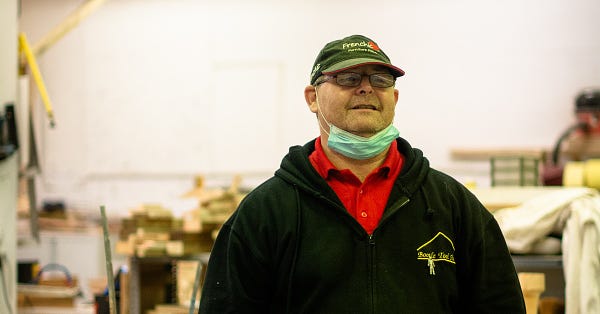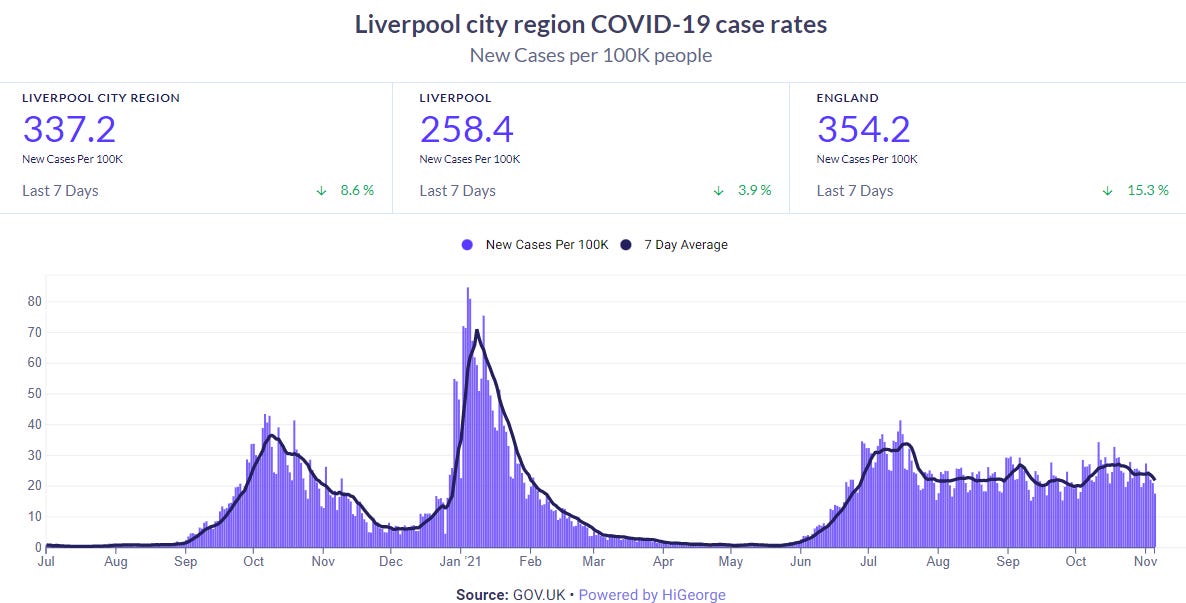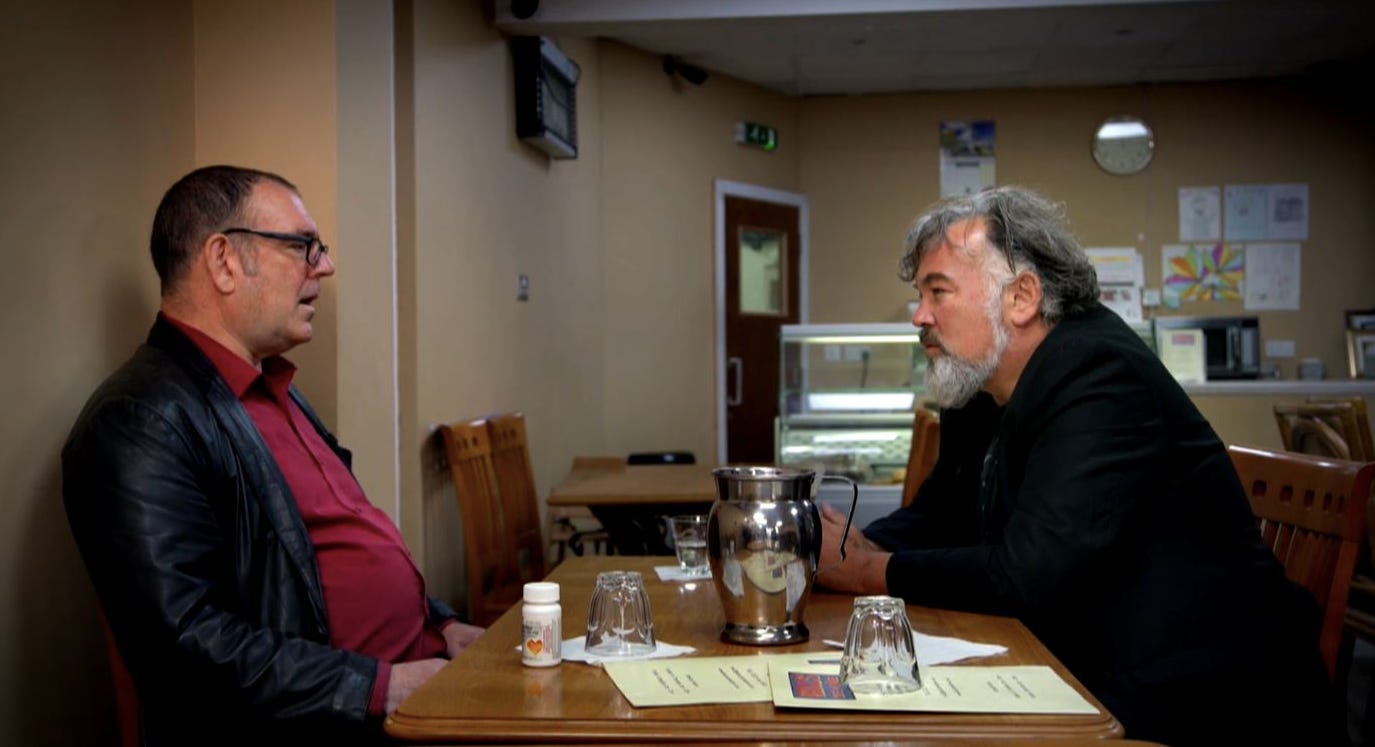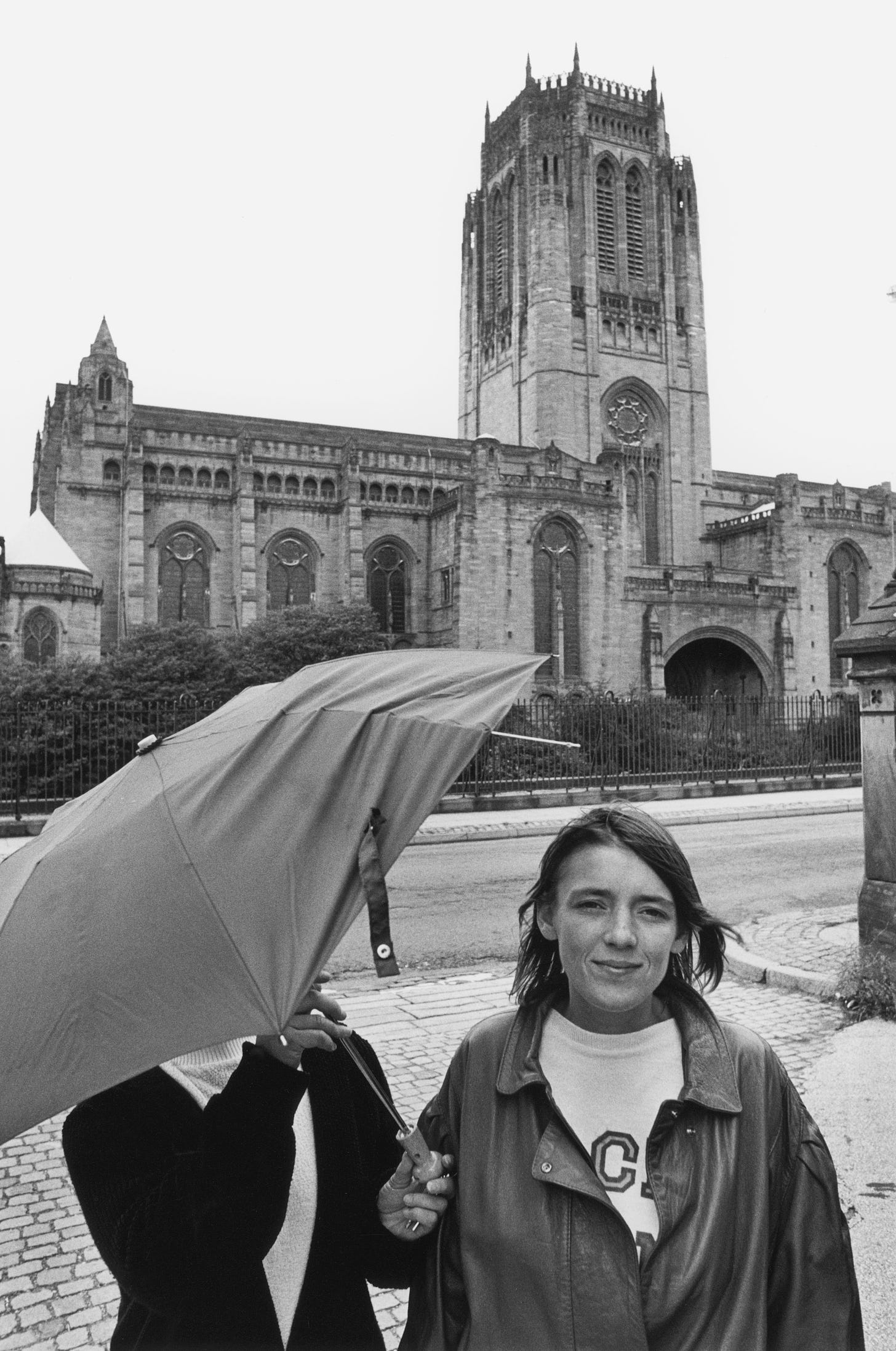A rare look at the secretive world of mortgage repossessions
Plus: a beautiful home of the week and the rest of our weekly briefing
Dear readers, welcome to the latest briefing from The Post.
Yesterday’s long read was about Bootle and the community efforts trying to give it a better future. You can read the piece here.
In case you missed it, here’s an extract:
In the tool shed, the social problems of Bootle are chipped away at like a length of pine on a workbench, and Flynn names half a dozen other community projects that are trying to push the town forward. “The people are unbelievable, they really are,” he says about his fellow residents. “Bootle does get slated a lot throughout the country,” he adds with regret. “They focus on crime rates and horrible things that have happened in this centre.”
If someone forwarded you this newsletter, subscribe now to get our long reads and weekly news briefings in your inbox.
Post paid launch
Don’t forget! We are launching our paid memberships this week. You will be able to pay £7 a month to get four editions of The Post every week in your inbox and support a completely new approach to journalism on Merseyside. Plus, you’ll join our community of engaged, interested readers and will be invited to membership discussions about our stories and the issues of the day.
Here’s what Michael Unger, the legendary former editor of the Liverpool Daily Post and a former director of the Guardian Media Group said about us and the need for this kind of journalism recently:
It’s really good news that The Post will be bringing quality journalism to Merseyside.
The media has gone through massive Internet-based change in the past few years which has allowed The Post and its sister website The Mill in Manchester to launch and to thrive.
Too often today’s traditional newspapers follow a clickbait philosophy merely to stay in existence: this leads to trivial stories and the unchecked publication of press releases. There is now so little ‘real’ journalism with the reporter stuck to his or her desk making sure they’ve hit their target of five stories a day.
The Post will be different. Stories and features that have had real time spent on them and stories and features that will make a difference.
This week’s weather ☁
Covid-19 update
Case rates have been very stable across Merseyside since August, as our dashboard below shows. The current rate (new cases per 100,000 residents over a week) for the Liverpool City Region is 337.2, down 8.6% in a week, compared to England’s 354.2, down 15.3%. Liverpool itself is a bit lower: 258.4, down 3.9%. Case rates are highest in St Helens, around 500 and lowest in Liverpool, around the 200 mark.
Click on the dashboard to look at the live version, which updates every day via data from Public Health England. Remember with our dashboard, the graph shows cases on a daily basis for the city region, whereas the numbers along the top are rates, which are calculated weekly. We’ll bring you a good update on vaccine numbers next week, but suffice to say: they are going up, but at such a glacial speed that you really have to peer at the graphs to see the increases.
The big story: Mortgage repossessions in St Helens
Top line: New data unearthed by the Bureau of Investigative Journalism and shared with The Post puts the spotlight on St Helens. The town has an unusually high number of mortgage repossession hearings.
Rewind: Last month, we published an in-depth story, working with the Bureau, about what has been going on inside Merseyside’s evictions courts — focusing on rental landlords and tenants. Here’s an extract from that piece:
In one hearing I witnessed, a solicitor told the court that his client, Mr Henley from St Helens, had struggled to pay off arrears due to the immense stress of his son being hospitalised with severe pneumonia and sepsis. But the case was brought on mandatory grounds, meaning the personal circumstances were rendered irrelevant in the eyes of the law.
The new numbers look at mortgage repossessions and show that St Helens has a particularly high volume of these kinds of hearings. Data journalists from the Bureau made a large database of proceedings at the 10 busiest eviction courts in the UK and found that in St Helens 26% of all cases were for mortgage repossessions, the highest proportion of any of the courts they analysed.
For comparison, in Manchester, it was 15% and in Birmingham 16%.
Out of 33 possessions hearings in St Helens, 12 of these were brought forward by Santander, and 9 by Lloyds Banking Group.
Court secrecy: Journalists working on this story across the country were repeatedly barred from eviction courts. One of the Bureau’s top reporters Maeve McClenaghan tweeted today:
As well as judges, lawyers for mortgage lenders repeatedly tried to get our journalists removed from the courts. And trade group UK Finance wrote to senior judiciary and our funders asking questions about why we were reporting these hearings...
Earlier this year the Financial Conduct Authority warned that repossessions should only happen as a “last resort”. Enhanced protections were offered to those with mortgages over the pandemic and possessions hearings were put on pause until 1 April this year. In that month, 30% of all claims brought to possession courts were mortgage claims.
Nationally, the investigation found:
Nearly half of cases ended in an outright possession order, meaning the lender could evict the homeowners.
In 81% of cases, the homeowner did not have any legal representation.
Go deeper: Open justice? The closed doors of possession courts: Read the Bureau of Investigative Journalism’s broader story.
Other Merseyside news in brief
Crime data | Government data shows Liverpool has the highest rate of hospital admissions for violence in England. The Echo reports: “neighbouring borough Knowsley is second, Sefton third, St Helens fourth and Halton fifth, with Wirral slightly further behind at ninth. The statistics, from data collected by Public Health England, represent the number of admissions per 100,000 of the population between 2017/18 and 2019/20, with Liverpool's standing at 127.7 after 2,055 admissions.” Read more.
Suspended sentence | A man who sexually abused a six-year-old when he was 18 in the 1990s has had his prison sentence suspended after suffering a car crash which has given him a life-altering brain injury. John Brady is now in adult foster care to be looked after mentally and physically. The judge said: “You no longer present any risk of danger because you struggle to care for yourself, let alone abuse anybody else. It's perhaps an act of mercy for you, but I am going to suspend the sentence.” Read more.
Stowaway kitten | A five-week-old kitten was found in a van engine after travelling 55 miles from Merseyside to Staffordshire. The driver found him after hearing a meowing sound and it took more than an hour to catch him as he kept darting between the chassis and the undercarriage. He has been affectionately named Ringo for his vocal skills and weighs 0.6kg. The RSPCA confirmed he is in good health and has asked his owner to come forward. Read more.
The lost football club | The mystery of a long lost Liverpool football club has been unearthed, showing the Wavertree area where Liverpool Caledonian AFC played. The Callies once beat Everton 1-0 and are believed to have then gambled their entire fortunes on one season. They ceased trading in 1892. Read more.
Home of the week
This lovely top floor one-bedroom flat is on the market for £150,000 near Sefton Park in L17. It features beautiful windows and has leafy surroundings.
Our favourite reads
This Observer feature is about Jean Jones, a former stripper from The Wirral. She opens up about her life in 60s Soho and how addiction and falling in love changed her. “In Hampstead, she lodged with an ex-boyfriend and, having no qualifications, picked up work wherever she could. Sometimes, she was an artist’s model, and sometimes, she travelled across London to have sex with men who responded to ads she placed — this was something she just ‘slipped into’, she says, though she knows this might sound odd — and it was on one of these assignments that she met John. ‘I remember it well,’ she tells me. ‘He was supposed to be a client, but we just started giggling, and it was such a relief.’ The two of them would be together for the next 20 years.”
The lofty reputation of the beautiful Birkenhead Park is cemented in this New York Times piece, which details how the American architect Frederick Law Olmsted was inspired by the park when designing Central Park in New York. It was the vastness and the open, shared quality which resonated with him. “It is hard to overestimate the influence of Birkenhead on Olmsted, who was captivated by the loftiest principles and most technical details. During his visit, he was struck by the park’s ability to foster egalitarianism, later writing that ‘the poorest British peasant is as free to enjoy it in all its parts as the British queen.’”
This is an interesting feature in Liverpool Confidential looking at the upcoming Renshaw Street Food Market, which opens sometime next month. It says that Renshaw Street is “a lost highway dotted with hidden gems” and argues for the importance of regenerating the more neglected parts of the city centre. “It’s certainly a step in the right direction for Renshaw Street, but we need to do a lot more. Liverpool is so much more than just the waterfront.”
Stewart Lee gives a fascinating interview in Bido Lito! ahead of the screening of his new rock documentary King Rocker, the story of the post-punk bands The Prefects and The Nightinghales lauded by John Peel who never quite made it past the precipice of success. “All those other big British provincial towns that had a punk scene in that era, had a spokesperson and a centre of gravity and Birmingham just had nothing. It’s not the Birmingham way. It’s not the way of people in the Midlands. There’s the arrogance and cockiness of the Cockneys, then there’s the arrogance and cockiness of Manchester and Liverpool. And in the middle, it’s a vacuum of a failure of self belief, where to be confident is seen as a sort of sin.”
Going slightly further afield, we were moved by this long read in the Guardian by writer Luke Brown. It’s about his hometown of Fleetwood, and how the loss of the fishing industry and growing discontent make Fleetwood “a symbol of the broken links between the metropolitan and the regional: the gulf in wealth, the suspicion of each other’s motives. On the day after the EU referendum, when Fleetwood, like much of the north, voted to leave, I was travelling up, and though I’d voted to remain and was feeling dismayed by the result, I was appalled to watch people I knew posting memes about how London and Scotland should join forces to form a new country and leave all the leave-voting racist morons to their fate.”


Post Picks
🎸 Gig | There’s a folk night tomorrow in a beautiful building in the Georgian Quarter which looks like fun. It features a series of acoustic performances from local artists David Holden, Herringbone John and Andrew Hesford. More info here.
🎙 Workshop | The writer and activist Chanelle Hunt is hosting a free online talk this Sunday which takes you through the history of black communities on Merseyside and the contributions of black cultural figures. It promises to “shake your preconceptions” and encourage collective learning. Book a place here.
🎨 Art class | The Bluecoat have a great series of art classes for adults which are well worth a try. Introduction to Cartooning, this Sunday afternoon, teaches you the fundamentals of depicting yourself and others in stylised cartoon form. Book here.
🎶 Arab Arts Festival | Liverpool Arab Arts Festival has a great selection of podcasts, experimental music, and art pieces on their website. We loved Kamel Saeed’s podcast about Al Jahiz, an eccentric Iraqi writer of 260 novels who was said to have been crushed to death by a collapsing pile of books, and this playlist by DJ Nooriyah.
📸 Exhibition | We liked Memories of the Near Future, an ongoing exhibition at Future Yard in Birkenhead. It’s a photography series that looks at the ancient stones and more recent developments on The Wirral in a highly-textured exploration of time and place. We also recommend stopping at the bar and coffee shop to try the Yard Pilsner. More details here.
🕊 Bird talk | Bird lovers will enjoy this free talk on Saturday morning hosted by the Palm House and the RSPB, which talks about the benefits of birdwatching and how to identify different garden birds. Join in here.
Go deeper: From Liverpool Bay, a flock of mysterious sea birds disappears into the night
⏯ Podcast | There’s a great podcast on BBC Sounds based on an 1836 letter to the local authority from a man called Peg Barnes, asking for money after he lost his job, and describing himself as “the only dwarf in Liverpool.” It’s funny at times, touching on political correctness, and it tells us what life was like for disabled people in the 19th century. “Sirs, I am a dwarf. I have lost my job at the circus and what is a dwarf to do in such a situation? In this Godforsaken place the snow comes so deep that a self-respecting dwarf can't even walk along the street without drowning!” Listen here.
Book of the week
We like the look of Ghost Town by Jeff Young, a memoir about his life growing up in Liverpool which also acts as a lovely tribute to the people and places he’s loved. A Guardian review called it “meditation on loss, a family album, an ode to the power of reading, a loving memorial to a city, and a long goodbye.”
Ghost Town is available to buy here.
Post from the past
Two women working as prostitutes in Liverpool, circa 1990. The Anglican cathedral is in the background. A feature in the Independent from 2011 talks about how sex work changed in the late 20th century:
When she first started on the streets in the 1980s, Liverpool's prostitutes were concentrated around the docks, the cathedral and Toxteth. But dockland redevelopment and a creeping gentrification of the city has forced them to find new beats.
Letters from readers
I enjoyed reading the article about the flocks of sea birds from Liverpool Bay. Great to read such articles and look forward to reading much more from The Post, Joyce
I've subscribed to The Post because as an ex-Publisher, quality local journalism really does matter to me. Join in and subscribe! John
Good luck with your new venture, Stephen










